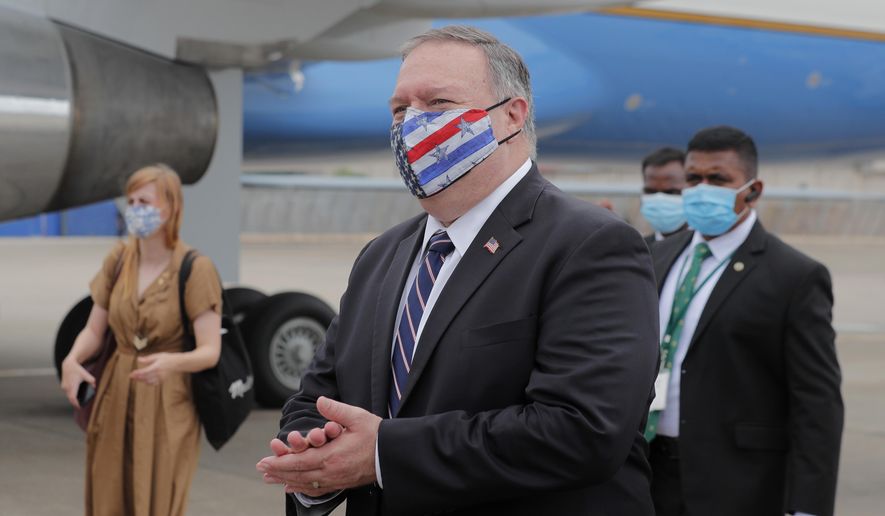JAKARTA, Indonesia — Secretary of State Mike Pompeo has added a stop in Vietnam to his Asia tour this week, amid simmering tensions with China over disputed claims in the South China Sea.
The State Department announced late Wednesday that Mr. Pompeo will travel to Hanoi to “reaffirm the strength of the U.S.-Vietnam comprehensive partnership and promote our shared commitment to a peaceful and prosperous region.
No other details of the visit were disclosed.
A senior Trump administration official said the visit is expected to include an important announcement about U.S.-Vietnam relations in the face of growing regional threats posed by China, which has been increasingly assertive in dealings with Hanoi and other countries in the region.
Mr. Pompeo is in Asia after visiting India for defense and security talks, and meeting with leaders of Sri Lanka and Maldives, small but strategically important states in South Asia. Mr. Pompeo’s message throughout the visit has been urging regional powers to push back against Chinese encroachment and keep the Indo-Pacific region free and open.
Vietnam is still a communist one-party state but has clashed with China over maritime claims and fishing rights in the South China Sea.
China has rebuilt some 3,200 acres of around disputed islands in the South China Sea, including the Parcel Islands that are claimed by Vietnam. In 2018, China began deploying anti-ship and anti-aircraft missiles on some of the islands, despite what U.S. officials have said was a promise by Chinese President Xi Jinping not to militarize the islands.
The visit to Vietnam was not scheduled as part of Mr. Pompeo swing through Asia but was added on during discussions over the past few days, aides say. The announcement of the visit was made by the Vietnamese government on Tuesday.
Mr. Pompeo is scheduled to meet with Vietnamese Prime Minister Nguyen Xuan Phuc and Foreign Affairs Minister Pham Binh Minh and take part in a celebration marking the 25th anniversary of diplomatic relations between the two states.
During a visit to Sri Lanka on Wednesday, Mr. Pompeo criticized China for seeking to expand its influence and its authoritarian communist system in Asia.
“We see from bad deals, violations of sovereignty and lawlessness on land and sea, that the Chinese Communist Party is a predator. The United States comes in a different way — we come as a friend, and as a partner,” Mr. Pompeo said.
In July, Mr. Pompeo said in a statement of Vietnam that “in the past, we were opponents on the battlefield. But today, our security relationship is all about cooperation.”
Vietnam currently is chairing the Association of Southeast Asian Nations and Hanoi has taken a strong stand against Chinese encroachment in the South China Sea.
In June, China’s navy sent a survey vessel through waters claimed by Vietnam in a warning to Hanoi not to conduct energy exploration projects.
In Hanoi this week, an agreement was reached involving Singapore’s Delta Offshore Energy company to use $3 billion of equipment and engineering services from U.S. firms Bechtel, General Electric and McDermott to build a liquefied natural gas power plant on the country’s southern coast.
Despite the deal, the U.S. and Vietnam have had an at-times rocky trade relationship under President Trump, whose administration said this summer it was investigating whether Hanoi was unfairly keeping its currency low to boost its trade balance with the U.S.
Mr. Nguyen earlier this week denied the charge and pressed the U.S. administration to have a “more objective assessment of the reality” of the Vietnamese economy. The U.S. is Vietnam’s largest single export market, but ranks far behind China, South Korea and Japan as an importer into the Vietnamese market.
• Bill Gertz can be reached at bgertz@washingtontimes.com.




Please read our comment policy before commenting.